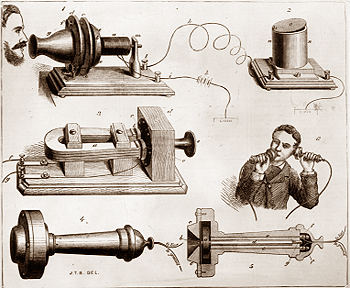 Have you ever had a great idea that you thought you could
sell and make lots of money in the process? In our history, America has been
full of many inventors with innovative ideas that have made life more
convenient. There is nothing like a great business idea, but there is a vast
expanse between those who have great ideas and those that make money with those
ideas. The bridge between the idea and the paycheck is effective marketing.
Have you ever had a great idea that you thought you could
sell and make lots of money in the process? In our history, America has been
full of many inventors with innovative ideas that have made life more
convenient. There is nothing like a great business idea, but there is a vast
expanse between those who have great ideas and those that make money with those
ideas. The bridge between the idea and the paycheck is effective marketing.
Getting there first
New ideas come around quite often, but great ideas have more
than just something new behind them: they have a marketing edge. Being the
first to market a new idea gives you a great advantage. For instance, the Apple
iPod revolutionized the way music is bought and listened to. Apple first
produced the iPod for the Christmas season in 2001, just ten years ago. It held
1,000 songs and outpaced everyone’s sales expectations. It was the product that
launched Apple common stock prices from $15 per share to over $500 per share in
those ten years. As soon as it became a hit, others followed quickly behind,
but never quite captured the market share that Apple was able to garner. The
iPod did something else besides make Apple shareholders rich: it laid the
groundwork for other new products. All of the sudden, the Apple brand was
synonymous with a hip, innovative company churning out new products in spades.
How did they do it? First, they recognized that there was a need for a small
portable music player. Before the iPod, there was the Walkman, with clunky
earphones and a frame that was too large to put in your pocket. But they also
went about marketing the iPod using a different method. Apple had developed
iTunes software that allowed you to download music to your computer. This was
new, something that made the Mac computer more than just a computer. It was now
your source for music. The iPod became the new portable device to hold all of
those songs, many more than any other portable device could have held prior to
this. You could purchase your own play list at a reasonable price. Steve Jobs,
the CEO and founder of Apple, became the spokesman for this new innovation
trend. He was the driving force behind Apple reinventing the way music was
sold, stored and listened to. Apple got there first and marketed their
computers, their software, their music store and their mobile music devices…
and cornered the market.
First doesn’t always mean first
Just because you have a great idea and you develop a
product, it is no guarantee you can capture the market. Alexander Graham Bell
is credited as the inventor of the telephone. Telecommunications giant AT&T
was birthed through Bell’s invention. Like Steve Jobs, he took the technology
of two other inventions – the phonograph record and the telegraph – and
combined them to transmit recognizable sound over long distances. However,
Western Union Telegraph hired electrical engineer Elisha Gray to develop a
telephone. It is believed that Gray actually constructed the first working
phone, but held off on patenting it and making his work public knowledge. It is
believed that Bell’s lawyers got a hold of Gray’s drawings and copied some of
the notes. Bell pushed to get his phone patented before Gray. In fact, Bell’s
patent filing only beat Gray’s phone patent by two hours after his lawyers were
tipped off by a patent office employee. There was a lawsuit over the rights of
the telephone that was settled by the U.S. Supreme Court in Bell’s favor. The
point is this: developing an idea does not a guarantee that your idea won’t be
replicated and even improved upon. The edge Bell had on Gray was his
willingness to take advantage of Gray’s reluctance to take the next step,
patent that idea and begin marketing the phone. As underhanded as that may
seem, if you are going to advance a new product or service idea, you have to
expect that others will find out about your idea sooner rather than later. If
it has any marketability, they will try to duplicate your efforts and
capitalize on it.
You cannot advance a new idea without implementing a
strategic marketing plan that captures as much of the market as soon after you
launch your product as possible. If you have a hot new item you are convinced
will sell, understand that the window to sell does not stay open forever. In
marketing, there is a time to push the gas to the floor and the reluctant often
get left behind only wishing they had made a marketing move to advance their
product.
______________________
Mar 7, 1876: Alexander Graham Bell patents the
telephone, This Day in History,
History.com
http://www.history.com/this-day-in-history/alexander-graham-bell-patents-the-telephone
Illustration ©Hulton Archive